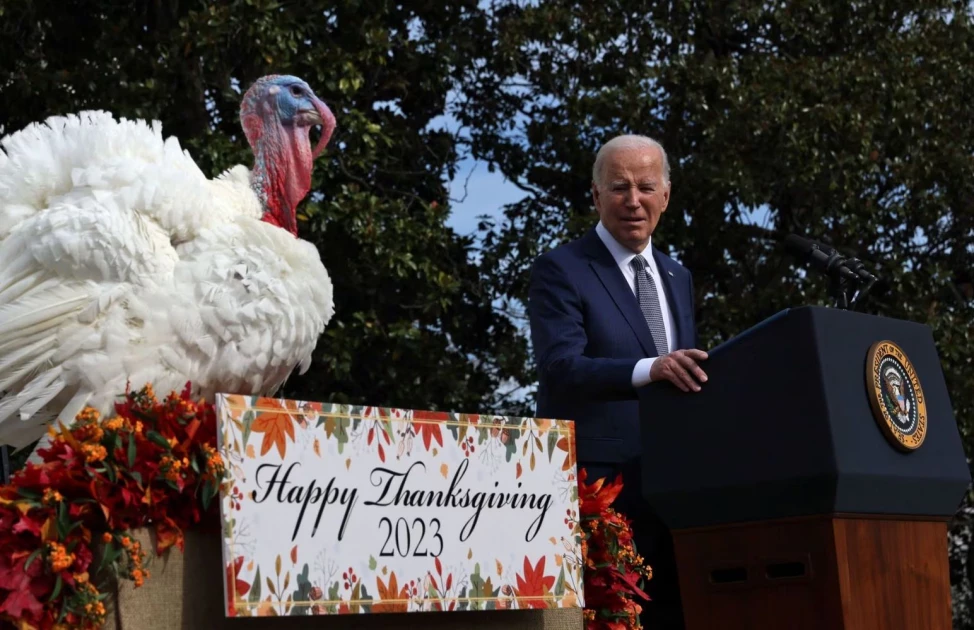Thanksgiving Day: History, evolution and meaning of the popular American holiday

U.S. President Joe Biden pardons the National Thanksgiving Turkey, Liberty, during the annual ceremony on the South Lawn at the White House in Washington, U.S., November 20, 2023. REUTERS/Leah Millis
The
history of Thanksgiving Day has different sides of the coin and it has evolved
over time.
While
modern historians have debated its inception, with some tracing it back to
1970, some argue that the first Thanksgiving wasn't quite the sign of a new
peace between the Pilgrims and Native Americans that it had been made out to
be.
Through
the years, our understanding of the history of Thanksgiving has evolved
alongside the traditions and foods that grace the holiday table.
The
history of Thanksgiving has been muddled, debunked, and rewritten throughout
history, and there is a new reason every year to carve a turkey and eat lots of
mashed potatoes.
The
holiday and the traditions behind it have evolved, from a much-mythologized
1621 harvest feast shared by the pilgrims and the Wampanoag to a post-Civil-War
era patriotic and religious gathering to the modern holiday focused on good
food and spending time with family
Over
the years, the word “thanksgiving” has changed in meaning. Originally an
English tradition, days of thanksgiving typically were marked by religious
services to give thanks to God, or to celebrate a bountiful harvest.
In
1941, the U.S. Congress passed a joint resolution that established the last
Thursday in November as Thanksgiving Day.
George
Washington was the first president of the United States to proclaim the first
National Day of Thanksgiving in 1789.
The
presidents who came after Washington ignored Thanksgiving tradition, until
President Abraham Lincoln again established it as a national holiday during the
Civil War, cementing the feast as an American tradition.
After
Lincoln’s proclamation, Thanksgiving typically took place on the last Thursday
in November.
For
many who celebrate now, the holiday has become an excuse to gather with family
and eat good food.
National
Day of Mourning
Since
1970, Native Americans and allies have gathered at Cole's Hill in Plymouth on
Thanksgiving Day for a National Day of Mourning.
It's
a solemn remembrance, honouring Native ancestors and protesting against the
racism and oppression they have endured over time.
The
Modern Tradition
Thanksgiving
in the United States falls on the fourth Thursday of November, followed by the
frenzy of Black Friday.
It's
a state public holiday, marked by closed government offices, schools, and
businesses.
Through
good and tough times, the tradition endures, from the Pilgrims celebrating
their first successful harvest to General Washington's troops pausing on the
way to Valley Forge during the fight for independence.
How
Turkey Became Part of Thanksgiving Menu
The
custom of snapping the turkey's wishbone, bringing luck to the person who gets
the larger half, can be traced back to the Romans.
The
star of most Thanksgiving dinners is a roasted turkey. After the bird is
cooked, the stuffing is taken out and served as a side dish.
The
gravy is also an important part of the meal and is obtained from the fatty
liquid that comes off the turkey as it cooks.
From
the 17th through the early 19th century, the presence of three or four kinds of
meat was important to emphasize that a meal was a feast
The
1621 harvest celebration featured venison, corn, shellfish, cornmeal, beans,
nuts, dried berries, pumpkin, and turkey.
The turkey, once a part of a diverse meat
ensemble, took centre stage after World War II.
National
Geographic reports that over 690 million pounds of turkey are consumed annually
on Thanksgiving.
According
to National Geographic, stuffing, once called "puddings in the belly"
by Pilgrims, was likely present at early harvest feasts. Pumpkin pie,
introduced by Native Americans, became an early American holiday staple.
However,
jellied cranberry sauce, mashed potatoes, and macaroni and cheese are more
recent additions to the Thanksgiving table.
Presidential
Proclamation
In
2023, US President Joseph Biden proclaimed Thanksgiving Day, urging Americans
to reflect on the support they've provided each other.
In
the spirit of goodwill and unity, he encouraged the nation to join together and
give thanks to friends, neighbours, family, and strangers who have supported
one another over the past year.
“I
encourage the people of the United States of America to join together and give
thanks for the friends, neighbours, family members, and strangers who have
supported each other over the past year in a reflection of goodwill and
unity," Biden's declaration read.
Want to send us a story? SMS to 25170 or WhatsApp 0743570000 or Submit on Citizen Digital or email wananchi@royalmedia.co.ke
Comments
No comments yet.


Leave a Comment